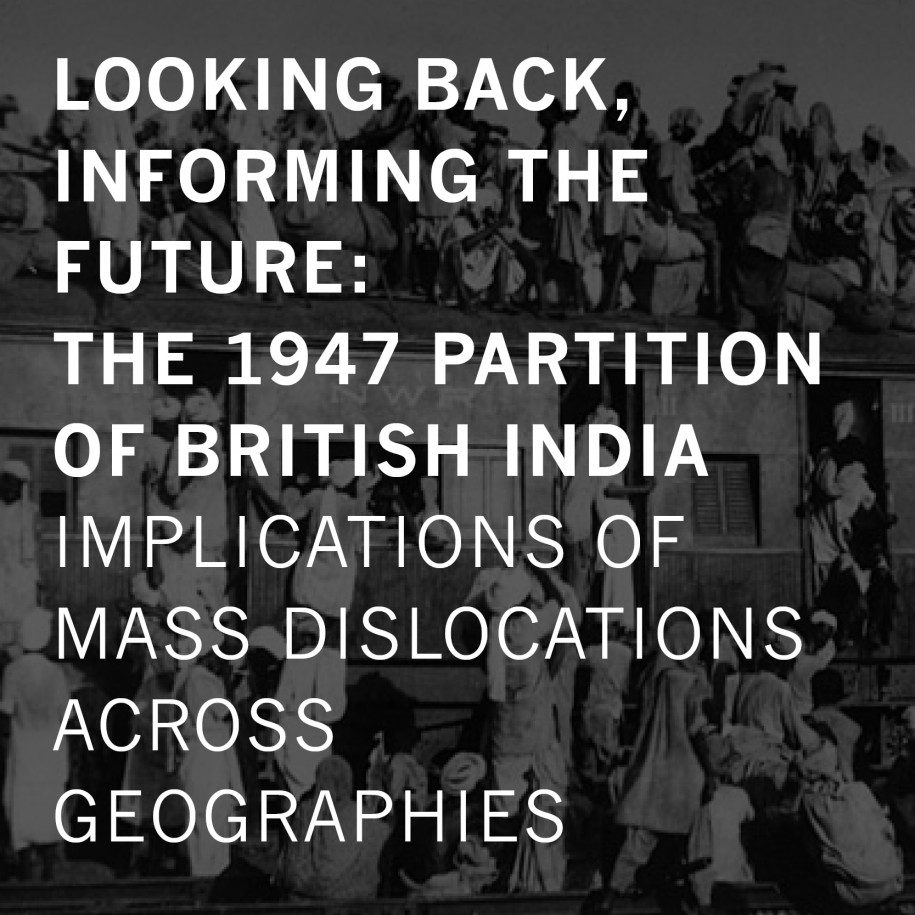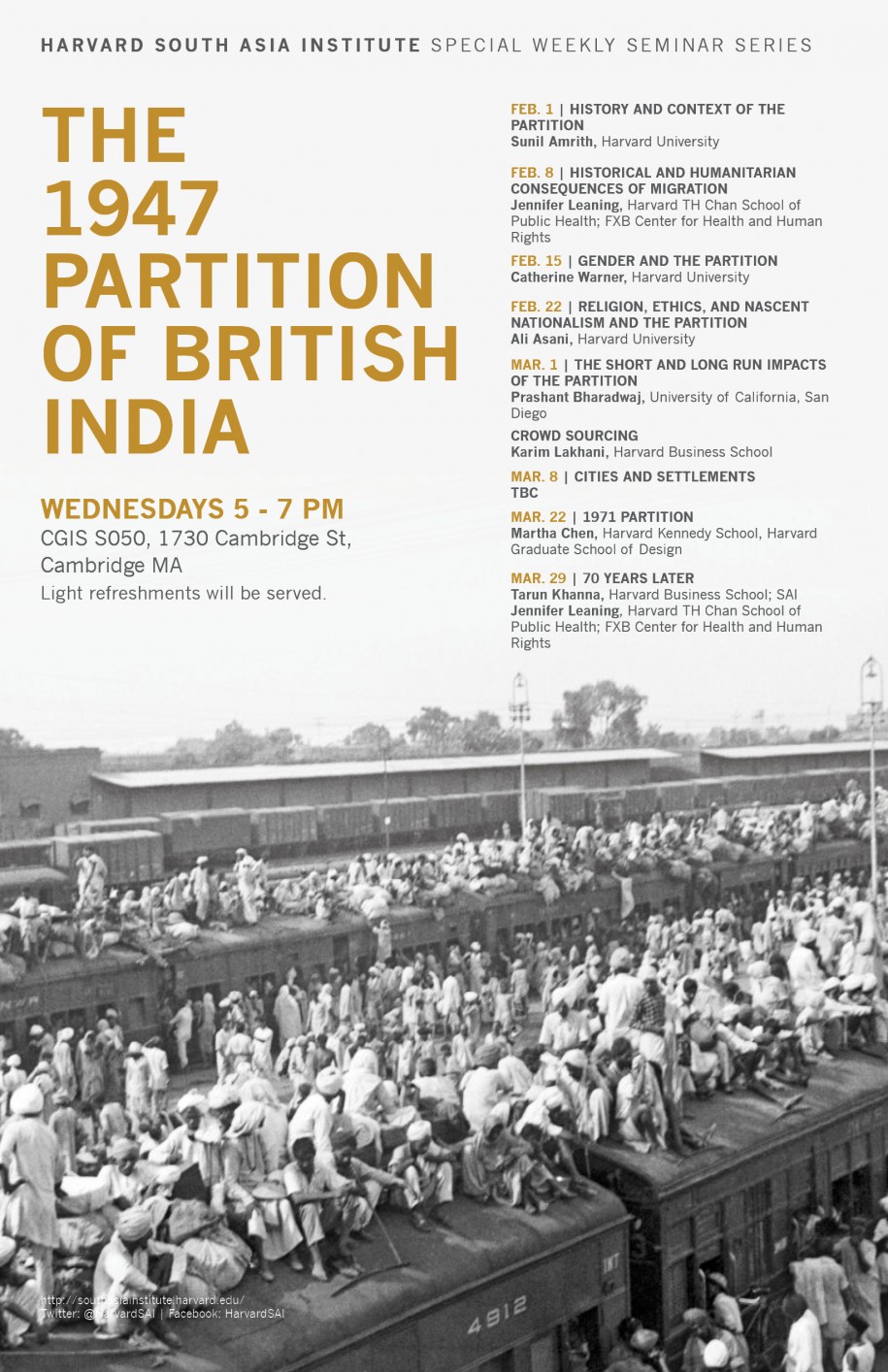Resources
The following resources complement the weekly Partition Seminar Series happening in February and March 2017. This list will be updated, so please check back in the future.
Whenever possible, we have included a publicly-available link to access each resource. However, due to copyright restrictions, some may only be available to Harvard affiliates with access to certain databases. If you are unable to access a resource, we recommend contacting your local institution or library.
Week 1: History and Context of the Partition
Dalrymple, William. ‘The Great Divide” . The New Yorker, June 29 2015, pp. 65 – 70.
Gilmartin, David. “The Historiography of India’s Partition: Between Civilization and Modernity”. The Journal of Asian Studies 74, 1 (2015): 23-41.
Kenny, Paul D. “The Origins of Patronage Politics: State Building, Centrifugalism, and Decolonization“. British Journal of Political Science, 2015, 45(1), pp. 141-171.
Roy, Asim. “The High Politics of India’s Partition: The Revisionist Perspective”. Modern Asian Studies 24, 2 (1990): 385 – 408.
Further reading:
Bandhopadhya, Sekhara. From Plassey to Partition: A History of Modern India. New Delhi: Orient Longman, 2004.
Bayly, Christopher. Indian Society and the Making of the British Empire. Cambridge: Cambridge University Press, 1988.
Khan, Yasmin. The Great Partition: The Making of India and Pakistan. New Haven: Yale University Press, 2007.
Week 2: Historical and Humanitarian Consequences of Migration
Chatterji, Joya, Dispersal and the Failure of Rehabilitation: Refugee Camp-dwellers and Squatters in West Bengal, Modern Asian Studies, 2007, Vol.41(5), pp.995-1032
Chatterji, Joya. “Partition Studies: Prospects and Pitfalls”. Asian Studies, 73, 2 (2014): 309-312.
Chattha, Ilyas. “Partisan Reporting: Press Coverage of the 1947 Partition Violence in the Punjab”. South Asia: Journal of South Asian Studies (2013): 1-18.
Copland, Ian. “The Master and the Maharajas: The Sikh Princes and the East Punjab Massacres of 1947”. Modern Asian Studies, 36, 3 (2002): 657-704.
Gatrell, Peter. “Refugees – What’s Wrong with History?”. Journal of Refugee Studies, 016 few013. doi: 10.1093/jrs/few013.
“The River Basin and Partition” (Chapter 6) and “The Indus Waters Treaty and its Afterlives” (Chapter 7) in: Gilmartin, David. Blood and Water: The Indus River Basin in Modern History. Oakland: University of California Press, 2015.
Hill, K; Seltzer, W.; Leaning, J.; Malik, S.J., and S.S. Russell. “The Demographic Impact of Partition in the Punjab in 1947.” Population Studies, July 01 2008, 62(2), pp. 155-170.
Kaur, Ravinder. “Distinctive Citizenship: Refugees, Subjects and Post-Colonial State in India’s Partition”. Cultural and Social History, 6, 4 (2015): 429-446.
MD, M. R., & Willem, V. S. ‘I am not a refugee’: Rethinking partition migration. Modern Asian Studies, 37 (2003): 551-584.
Further Reading:
Ahmed, Ishtiaq. The Punjab: Bloodied, Partitioned and Cleansed. Karachi: Oxford University Press, 2012.
Ansari, Sarah. Life after Partition: Migration, Community and Strife in Sindh, 1947–1962. Karachi: Oxford University Press, 2005.
Bhaskar Rao, U. The Story of Rehabilitation. Delhi: Delhi Department of Rehabilitation, Ministry of Labour, Employment and Rehabilitation, Govt. of India, 1967.
Bourke-White, Margaret. Halfway to freedom; a report on the new India in the words and photographs of Margaret Bourke-White. New York: Simon and Schuster, 1949.
Chester, Lucy. Borders and Conflict in South Asia: The Radcliffe Boundary Commission and the Partition of Punjab. Manchester: Manchester University Press, 2009.
Copland, Ian. “The Further Shores of Partition: Ethnic Cleansing in Rajasthan 1947 ,” Past & Present 160 (August 1998 ): 203 -3910.1093/past/160.1.203
Gatrell, Peter. The Making of the Modern Refugee. Oxford: Oxford University Press, 2013. Chapter 5: “MIdnight’s Refugees? Partition and its Aftermath in India and Pakistan”.
Lambert, Richard D. Hindu-Muslim Riots. Karachi: Oxford University Press, 2013.
Panayi, P. and Virdee, P. (eds.) Refugees and the end of empire : imperial collapse and forced migration in the twentieth century. Basingstoke : Palgrave Macmillan, 2011.
Roy, Haimanti. Partitioned Lives: Migrants, Refugees, Citizens in India and Pakistan, 1947-65. Oxford: Oxford University Press, 2012.
Zamindar, Vazira Fazila-Yacoobali. The Long Partition and the Making of Modern South Asia: Refugees, Boundaries, Histories. New York: Columbia University Press, 2007.
National Documental Center (Pakistan). Disturbances in the Punjab: 1947. Islamabad : Government of Pakistan, Cabinet Division, National Documentation Centre, 1995.
Week 3: Gender and the Partition
Das, Veena. “The Figure of the Abducted Woman.” In Life and Words: Violence and the Descent into the Ordinary, 18-37. Berkeley: University of California Press, 2007.
Butalia, Urvashi. “Women.” In The Other Side of Silence : Voices from the Partition of India, 85-136. Durham, NC: Duke University Press, 2000.
Primary source reading is forthcoming.
Week 4: Religion, Ethics, and Nascent Nationalism and the Partition
Bhagavan, Manu. “Princely States and the Hindu Imaginary: Exploring the Cartography of HIndu Nationalism in Colonial India”. The Journal of Asian Studies, 67, 3 (2008): 881-915.
Ghosh, Gautam. “God is a Refugee’: Nationalism, Morality and History in the 1947 Partition of India.” Social Analysis, Mar 1998, Vol.42(1), pp.33-62.
Giunchi, Elisa. “The Reinvention of Shari’a under the British Raj: In Search of Authenticity and Certainty”. The Journal of Asian Studies, 69, 4 (2010): 1119-1142.
Majid, Abdul, Hamid, Abdul and Zahida Habib. “Genesis of the Two Nations Theory and the Quaid-e-Azam”. Pakistan Vision, 15, 1 (2014): 180-192.
Mohanka, Payal Singh. “Religion and Conflict in India: A Sikh Perspective”. The Round Table, 94, 382 (2005): 589-598.
Sen, Dwaipayan. “Caste Politics and Partition in South Asian History”. History Compass, 10, 7 (2012): 512-522.
Further Reading:
Bloch, Esther, Keppnd, Marianne and Rajaram Hegde, Editors. Rethinking Religion in India: The Colonial Construction of Hinduism. London: Routledge, 2010.
Haq, S. Moinal. “The Two-Nation Idea in History (A Brief Survey).” Journal of the Pakistan Historical Society 24 (1976): 153-174.
Jaffrelot, Christopher. Secularization without Secularism in Pakistan. 2012.
Khan, Naveeda. Muslim Becoming: Aspiration and Skepticism in Pakistan. Durham: Duke University Press, 2012.
Rahman, M. Raisur. Locale, Everyday Islam, and Modernity: Qasbah Towns and Muslim Life in Colonial India. New Delhi: Oxford University Press, 2015.
Ramey, Steven Wesley. Hindu, Sufi or Sikh: Contested Practices and Identifications of Sindhi Hindus in India and Beyond. New York: Palgrave Macmillan, 2008.
Week 5: The Short and Long Run Impacts of the Partition
Bharadwaj, Prashant, Khwaja, Asim I. and Atif Mian. “Population Exchange and its Impact on Literacy, Occupation and Gender: Evidence from the Partition of India”. International Migration, 2015, 53(4), pp. 90-106.
Iyer, Lakshmi. “Direct vs. Indirect Colonial Rule in India: Long-Term Consequences”. The Review of Economics and Statistics 93, 4 (November 2010), 693-713
Kaur, Ravinder. “The Last Journey: Exploring Social Class in the 1947 Partition”. Economic and Political Weekly, June 3 2006 pp. 2221-2228.
Week 5: Crowdsourcing
Lakhani, Karim and Boudreau, Kevin. ‘Using the Crowd as an Innovation Partner.’ Harvard Business Review. April 2013.
Roth, Alvin E. What Have We Learned from Market Design? Innovation Policy and the Economy, Volume 9. University of Chicago Press, pages 79-112, February 2009.
Lakhani, Karim and Panetta, Jill. The Principles of Distributed Innovation. MIT Press 2007.
Week 6: Cities
Kudaisya, Gyanesh. “The demographic upheaval of partition: Refugees and agricultural resettlement in India, 1947–67.” South Asia: Journal Of South Asian Studies Vol. 18 (1),1995, pp. 73-94.
Week 8: 1971 Partition
“Rupture in South Asia”, from: Cutts, Mark, The State of the World’s Refugees 2000: Fifty Years of Humanitarian Action. Geneva: UNHCR. 2000.
Feldman, Shelley. “Feminist Interruptions: The Silence of East Bengal in the Story of Partition.” Interventions, 01 January 1999, Vol.1(2), pp.167-182.
Hashem, Ferhana. “Elite Conceptions of Muslim Identity from the Partition of Bengal to the Creation of Bangladesh, 1947 – 1971”. National Identities, 12, 1 (2010): 61-79.
Mookherjee, Nayanika. ‘Remembering to forget’: public secrecy and memory of sexual violence in the Bangladesh war of 1971”. Journal of the Royal Anthropological Institute, 12, 2 (2006): 433-450.
Oldenburg, Philip. “A Place Insufficiently Imagined”: Language, Belief, and the Pakistan Crisis of 1971”. Journal of Asian Studies, 44, 4 (1985): 711.
Further Reading:
Zaheer, Hasan. The separation of East Pakistan: The rise and realization of Bengali Muslim nationalism. Oxford University Press, USA, 1994.
Week 9: 70 Years Later
Lall, Marie. “Educate to Hate: The Use of Education in the Creation of Antagonistic National Identities in India and Pakistan.” Compare: A Journal of Comparative Education, 2008, Vol.38(1), p.103-119.
Mallavarapu, Siddharth. “South Asian Cultures of the Bomb: Atomic Publics and the State in India and Pakistan.” The Journal of Asian Studies, 2011, 70(3), pp. 858-859.
Varshney, Ashutosh. “India, Pakistan, and Kashmir: Antinomies of Nationalism.” Asian Survey 31.11 (1991): 997-1019.


